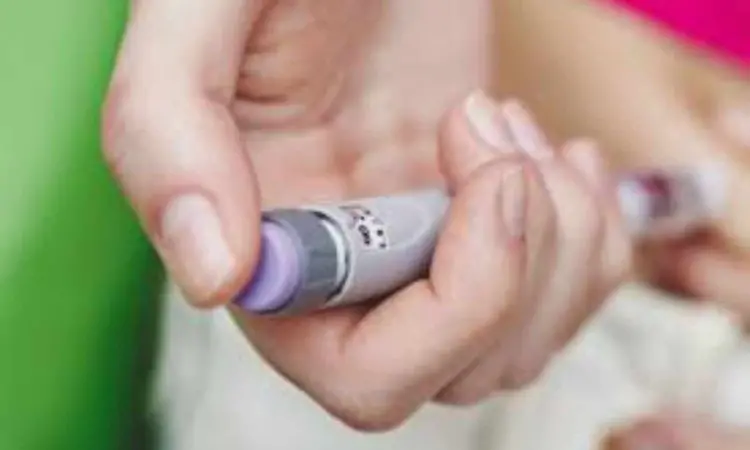- Home
- Medical news & Guidelines
- Anesthesiology
- Cardiology and CTVS
- Critical Care
- Dentistry
- Dermatology
- Diabetes and Endocrinology
- ENT
- Gastroenterology
- Medicine
- Nephrology
- Neurology
- Obstretics-Gynaecology
- Oncology
- Ophthalmology
- Orthopaedics
- Pediatrics-Neonatology
- Psychiatry
- Pulmonology
- Radiology
- Surgery
- Urology
- Laboratory Medicine
- Diet
- Nursing
- Paramedical
- Physiotherapy
- Health news
- Fact Check
- Bone Health Fact Check
- Brain Health Fact Check
- Cancer Related Fact Check
- Child Care Fact Check
- Dental and oral health fact check
- Diabetes and metabolic health fact check
- Diet and Nutrition Fact Check
- Eye and ENT Care Fact Check
- Fitness fact check
- Gut health fact check
- Heart health fact check
- Kidney health fact check
- Medical education fact check
- Men's health fact check
- Respiratory fact check
- Skin and hair care fact check
- Vaccine and Immunization fact check
- Women's health fact check
- AYUSH
- State News
- Andaman and Nicobar Islands
- Andhra Pradesh
- Arunachal Pradesh
- Assam
- Bihar
- Chandigarh
- Chattisgarh
- Dadra and Nagar Haveli
- Daman and Diu
- Delhi
- Goa
- Gujarat
- Haryana
- Himachal Pradesh
- Jammu & Kashmir
- Jharkhand
- Karnataka
- Kerala
- Ladakh
- Lakshadweep
- Madhya Pradesh
- Maharashtra
- Manipur
- Meghalaya
- Mizoram
- Nagaland
- Odisha
- Puducherry
- Punjab
- Rajasthan
- Sikkim
- Tamil Nadu
- Telangana
- Tripura
- Uttar Pradesh
- Uttrakhand
- West Bengal
- Medical Education
- Industry
Once-weekly insulin icodec better than once-daily basal insulin analogues in type 2 diabetes: Study

Karnataka: A meta-analysis of ONWARDS phase 3 randomized controlled trials (RCTs) revealed that once-weekly insulin icodec led to a higher glycated A1c reduction than once-daily basal insulin analogues in type 2 diabetes (T2D) patients, without major safety concerns.
"Once-weekly insulin icodec showed a better reduction in HbA1c with a higher proportion of patients achieving HbA1c targets in comparison with once-daily basal insulin analogues," the researchers reported in Diabetes, Obesity and Metabolism. "There were no major safety concerns concerning hypoglycaemia or adverse events."
Insulin icodec, a novel ultra-long action basal insulin analogue, is designed for once-weekly administration. It promises better adherence and greater treatment satisfaction because of reduced injection and frequency, with the merit of once-a-week administration. The study authors, Sahana Shetty and Renuka Suvarna from Manipal Academy of Higher Education, Department of Endocrinology, Kasturba Medical College, Manipal, Karnataka, aimed to ascertain the safety and efficacy of once-weekly insulin icodec in comparison with other basal insulin analogues in the management of type 2 diabetes.
During the study's conduct, the PRISMA guidelines were followed. Five databases and ClinicalTrials.gov were screened for eligible studies until July 2023. All RCTs comparing the safety and efficacy of insulin icodec in T2D versus other insulin analogues were included. The extracted data were then analysed for meta-analysis using RevMan 5.3 software.
Five clinical trials comprising 3764 participants were included. Based on the meta-analysis, the researchers reported the following findings:
- Once-weekly insulin icodec had higher glycated haemoglobin (HbA1c) reduction [mean difference −0.17%], with no significant difference in fasting plasma glucose compared with other insulin analogues.
- HbA1c achievement <7% [odds ratio 1.51] and HbA1c achievement <7% without hypoglycaemia [odds ratio 1.45] were observed in higher proportions with insulin icodec compared with the comparator group.
- The percentage of time spent in the target glycaemic range was comparatively similar between insulin icodec and the comparator [mean difference 2.42%].
- There was a significantly higher incidence of level 1 hypoglycaemia with insulin icodec, but no significant difference was seen for the incidence of levels 2, 3 and combined 2/3 hypoglycaemia.
- Any adverse events and adverse events related to basal insulin were comparably similar in insulin icodec and comparators.
- The subgroup analysis of once-weekly insulin icodec with individual insulin analogues (glargine U100 and degludec) showed that insulin icodec had similar efficacy with insulin glargine U100 but superior efficacy with higher HbA1c reduction with insulin icodec compared with insulin degludec.
- The safety profile was comparable between insulin icodec and glargine U100, whereas insulin icodec reported a higher incidence of hypoglycaemia events and any adverse events when compared with degludec.
"The findings suggest that once-weekly insulin icodec is not only noninferior to other basal insulin analogues but also statistically superior in terms of glycaemic efficacy," the researchers wrote.
Adding that, "the presentation of a similar safety profile with other basal insulin analogues and addressing hypoglycaemia concerns would lead to better insulin intensification to achieve the desired target. Sustained glycaemic control with once-weekly injections of insulin icodec would lead to better treatment satisfaction and patient acceptance."
"Further long-term follow-up in clinical trials would be helpful to show long-term safety and additional metabolic advantages of once-weekly insulin icodec," they concluded.
Reference:
Shetty S, Suvarna R. Efficacy and safety of once-weekly insulin icodec in type 2 diabetes: A meta-analysis of ONWARDS phase 3 randomized controlled trials. Diabetes Obes Metab. 2024 Jan 8. doi: 10.1111/dom.15408. Epub ahead of print. PMID: 38192022.
Dr Kamal Kant Kohli-MBBS, DTCD- a chest specialist with more than 30 years of practice and a flair for writing clinical articles, Dr Kamal Kant Kohli joined Medical Dialogues as a Chief Editor of Medical News. Besides writing articles, as an editor, he proofreads and verifies all the medical content published on Medical Dialogues including those coming from journals, studies,medical conferences,guidelines etc. Email: drkohli@medicaldialogues.in. Contact no. 011-43720751


